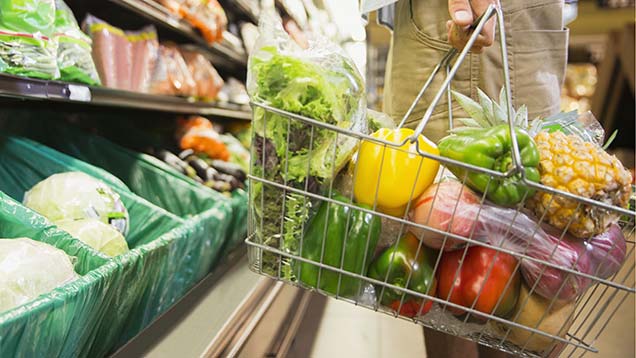Supermarket price war ‘putting agri-food firms out of business’
 (c) Rex
(c) Rex Supermarket price wars are putting an increasing number of farmers and food companies out of business, says a leading accountancy firm.
The number of food companies entering insolvency in 2014 increased 28% year on year, according to an analysis of Companies House data by Moore Stephens – up from 114 in 2013 to 146 this year.
Although this included farmers and growers, as well as secondary food processing businesses, the true number of producers going out of business was likely to be far higher because many farmers operated as sole traders and so were not registered with Companies House.
The increase could be blamed on the retailers’ drive towards cheaper checkout prices, which was squeezing the supply chain to prop up profits, said the accountants.
Duncan Swift, partner at Moore Stephens, who leads the company’s food advisory group, said: “The supermarkets are going through the bloodiest price war in nearly two decades and are using food producers as the cannon fodder.
See also: Producers told to use groceries code adjudicator or lose it
“Supermarkets have engaged in questionable buying practices for years, but it’s getting worse and clearly wreaking havoc on the UK food production sector.
“UK supermarkets are trying to compete on price with Aldi and Lidl, but with profit margins that are far higher than these discount chains. To try to make the maths work, the big supermarkets are putting food producers under so much pressure that we have seen a sharp increase in the number of producers failing.”
Major cashflow problems were being caused by increasing requests for supplier “contributions” (payments towards costs such as marketing and shelf positioning), as well as delayed payments, said Mr Swift.
“It’s a raw deal for food producers who need the supermarkets to reach the public, but who can’t afford the terms of business that the supermarkets foist on them,” he said.
The number of producers and food companies going out of business was likely to continue to increase because it usually took about two years for a food company to go bust after it initially entered financial distress, said Mr Swift.
Andrew Opie, director of food and sustainability and the British Retail Consortium, responded by saying the research was “far too simplistic to blame retailers”.
“All major supermarkets know the only way to deliver consistent quality and value in a competitive market is by building long-term sustainable relationships with their suppliers. That’s why so many suppliers have worked with the same retailer for so long.
“There may be a number of reasons for failure and we don’t know if they supply retailers, and even if they do, they are likely to have other customers.
“Retailers operate in a highly regulated supply chain with a strict code of practice governing contracts and an adjudicator appointed by parliament specifically to ensure fair dealing.”
But this “ignored the elephant in the room”, said Mr Swift – the fact the majority of fresh produce grown in the UK went either directly or indirectly across the desks of the top ten supermarkets. And also the fact the majority of suppliers still feared speaking out against retailers and so did not take evidence to the groceries code adjudicator.
To avoid financial problems, supermarket suppliers should be sure that the relationship they have with a retailer is profitable, and should seek advice quickly if it is not, advised Mr Swift.
The increase in solvency is in stark contrast to businesses in the UK economy as a whole, which saw liquidations drop from 16,631 in 2012 to 14,092 in 2014.
